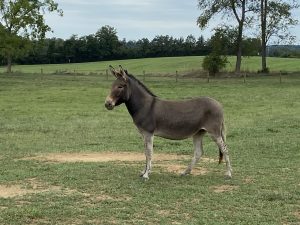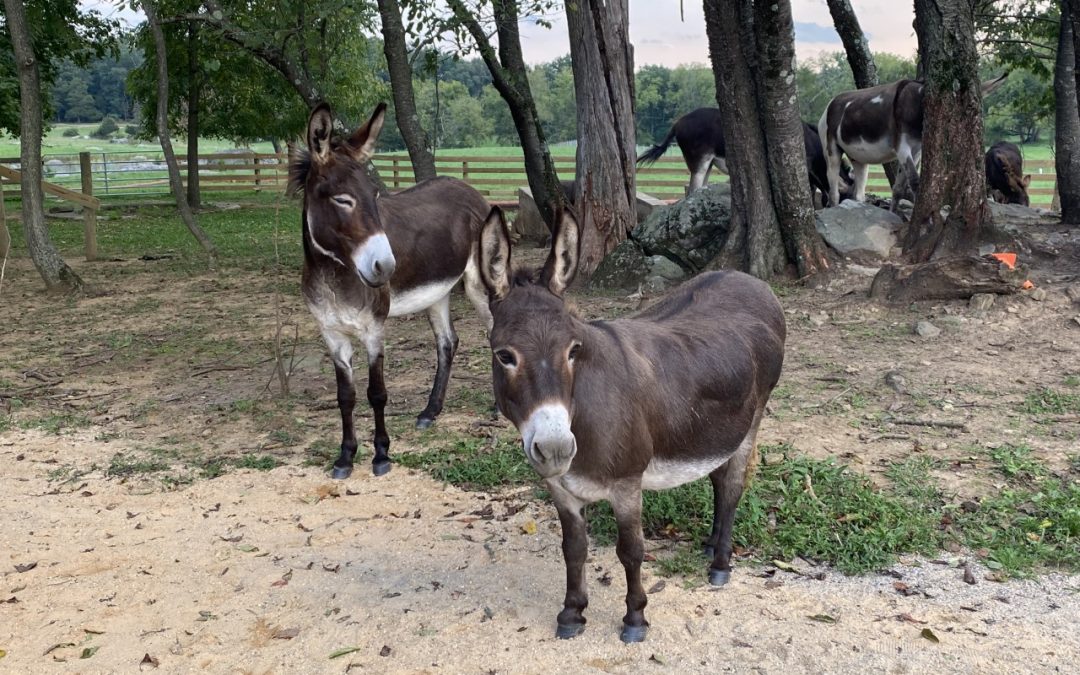Cheryl Pokorny and Valerie Lowe started Little Longears Miniature Donkey Rescue as a rescue and sanctuary for miniature donkeys. And if you haven’t met one, it’s your loss. They are like big dogs. If they know you and love you, they’re just wonderful beings. I’ve met them and hugged them and I’m smitten!
Since becoming an animal communicator, I’m more focused on the importance of treating living creatures with love and respect. Because of this, I want to give you a chance to fall in love with Little Longears and the equine souls that live there, too. Just open your heart!
This blog is from an interview with Cheryl. It’s been revised for clarity and brevity.
Watch our interview here.
Donkey rescue sneaks up on them
Cheryl shares:
We got into this without any donkey background. I was a public high school teacher for many years. And Valerie had been a professional horse trainer. As a trainer, she was in the horse show world and travelled all over the country.
When we met, we bought a small horse farm in Maryland to retire some of her show horses there. I thought it would be fun to get a couple of little miniature donkeys. Just kind of popped in my head.
I said, “Hey, we have all this space and a beautiful barn. Let’s get a couple little donkeys to keep the horses company.” So I found two donkeys who were bought at an auction. Now that we had Nestor and Sassafras as pets, we started researching more about donkeys and auctions.
Donkeys rescued from auctions
When we began, we found most of our donkeys at auctions. There’s a huge network of auctions all over this country for horses and donkeys that are slaughter bound. They are sent to Mexico or Canada because you can’t slaughter in the US.
They slaughter them for meat, or with donkeys, it’s mostly for their hides. Unfortunately, this has become a huge worldwide problem with donkeys. There’s the Traditional Chinese Medicine thing happening now in China where they’re basically decimating the donkey population for their hides.
But they’re very needed in many countries as working animals. And as the donkey hide trade expands, these working animals are stolen from family farms and taken to be slaughtered for their hides. So it’s become quite an issue in these other countries.
[If you’re interested in helping equines in other countries, Cheryl recommends Brooke USA. This charity helps working horses, donkeys and mules worldwide. They have a high rating from Charity Navigator.]
Donkeys surrendered by their people
These days, the vast majority of our donkeys come as owner surrenders. As more people heard about us, we received calls from folks who could no longer care for their animals. That’s because donkeys can live for 40 years, so they’re outliving their people.
These people didn’t know what to do. They’re aging and no one else in their family wanted the animal. But they don’t want to send them to an auction because they love their animal.
However, it’s not like you can just call up the humane society and say “Hey, will you take my donkey?”
So we provide a soft landing for a lot of these animals. As you can imagine, this has been a huge comfort for so many people.
Donkey nature
They’re like big dogs. For example, they’re super loving and social and friendly. If you haven’t met a donkey, you really need to. They are the kindest, most gentle, loving, introspective beings on this planet.
Donkey myths
You know, there are so many myths about donkeys! For example, that they’re mean; they bite and kick. Plus, they’re stubborn. All of those myths are so far from the truth that I don’t want people to say “See, those donkeys are mean, they bite. That’s what I’ve heard!” Because it’s so rare.
Sadly, some rescue donkeys survived terrible physical treatment by humans. And donkeys don’t forget anything. So if they’ve been treated badly, they’re going to remember that. If they’ve been treated lovingly, they’re going to remember that.
If you can, I would encourage you to spend time with them to help educate and dispel the myths out there about donkeys.
Not only donkeys

Valerie, Arabella (miniature horse) & Hiccup (miniature mule)
We have quite a few mules now, which of course is a donkey-horse cross. And we have some miniature horses that came with some donkeys – a mixed herd. Truthfully, we just couldn’t turn down the miniature horses. We weren’t going to discriminate just cause their ears were short!
A Zonkey joins the crew

Margarita the Zonkey
Oh, and we have one Zonkey! That’s a zebra-donkey hybrid. Someone definitely got in over their head when they got her!
That’s because zebras aren’t domesticated. In fact, her people didn’t even realize they had a Zonkey. But they couldn’t do anything with her. She jumped fences and wouldn’t let people handle her.
So we took her in! Currently she’s decompressing as she enjoys her mule, horse and donkey friends!
Everything’s on donkey time
Maribeth: You know, with the time I’ve spent with you, what came across first was your commitment to never hurting or forcing animals. You allow these beautiful beings decompress on their own time. They have choices and move at their own pace.
We don’t set an agenda for anybody here. We’re not in a rush with anybody. If someone takes a month to let us touch them or love on them or 10 years… that’s up to them. We do what we can to help them feel comfortable and safe and loved. But there’s no timeframe. We joke that everything’s on donkey time.
And mule time…
Mule time is even more different. As in, they’re slow, very thoughtful, cautious beings. They think things through very carefully. They won’t be pressured into doing anything they feel is unsafe.
That’s why they’re perceived as stubborn. Because if humans try to make them do something faster than they’re ready to do, that scares them. Then plant their four little feet and shut down. You can’t move them.
At that point, we take a deep breath, and let them move at their own pace. When they feel safe, they move on.
This donkey rescue received accreditation
From Maribeth: I’ve done my research and I don’t want to give money to people who are holding animals – I’m going to say the word – captive- solely to make money off them. If the animal’s welfare ain’t “Number 1,”, I don’t want to support them financially. Before I contribute, I look for accreditation and/or their Charity Navigator rating. So I’m thrilled Little Longears is accredited.
Little Longears is accredited by the Global Federation of Animal Sanctuaries.
It’s a huge milestone. This accreditation isn’t just a donkey thing. The Global Federation covers all types of beings, and we’re proud to be a part of that. They set a higher standard of care, knowledge, and how the organization operates.
A philosophy of ethics, love and care
We just moved from a 15-acre farm to 100 acres of magical, magical sanctuary. There’s space to grow.
Our goal goes beyond taking in animals just to throw them in a pasture. In our past, we’ve had to rescue other rescues. They may have started well, but their animals didn’t end well off. From that experience, we decided we never want to be like that.
You know, these donkeys have been through so much. We want them to know they’re safe and going to be cared for the rest of their days. That’s whether they stay in our sanctuary or get adopted into a loving home.
How can we support donkey rescue?
Financial support is the best. Monetary donations help pay for hay, straw, grain, the vet and the farrier. To keep these guys well trimmed, our farrier is here every week.
And we need regular volunteers! We’re in New Oxford, Pennsylvania, not far from Gettysburg and Hanover. So if you’re local, we’d love your help!
Finally, some people like to donate blankets, treats, or toys. There’s a wish list on Amazon for people who want to buy tangible things.
Can a feral miniature mule learn trust?
Little Longears Miniature Donkey Rescue
Little Longears is a registered nonprofit charity dedicated to the rescue, rehabilitation, and safe sanctuary of abused, neglected, or otherwise unwanted donkeys. They provide a haven for people to surrender their donkeys when they’re no longer able to care for them.
After veterinarian, farrier, psychological, and training needs are met, Little Longears’ goal is to place adoptable donkeys into permanent loving homes or if not, provide permanent sanctuary.
Learn more on their website at https://www.littlelongears.org/
To support donkeys globally, visit Brooke.
Have you spent time with donkeys? I’d love to hear your experience.


Words can not express my happiness that longears took my mini horse and donkey Dixie and Romeo. I have visited their new home with Cheryl and valarie and they are so well cared for along with all the longears and so happy it is heaven on earth. These two super ladies dedicate their time care and hearts and love to their four legged kids. I donate when I can and believe me all donations are put to use for the care and comfort of their adopted kids. Safe from harm hurt and abuse I thank these ladies who care and love them night and day. This rescue is worth your time to visit and see the care and love provided for my kids and all longears. You will agree it is the best ,heaven on earth I encourage all to consider helping out with donations you will find it is a great place to help all the unwanted ones who they saved and kids like mine who needed a safe happy home with love 💗 sandy stoner
Sandy, Thanks so much for sharing about Little Longears AND Dixie and Romeo! Cheryl and Valerie do such good work for all the souls in their care! I support them monthly.
Hi,
I’m from Chesapeake Va, with a small farm of 3.7 acres with 10 goats. I’m looking for a Jenny and Jack for my grandchildren.
First let me say you are wonderful individuals for rescue of animals as you do.
Do you ever sale any of the donkeys maybe 3?
Sincerely
Bill underwood
God bless & happy holiday
Hi Bill, Please contact Little Longears directly at https://www.littlelongears.org/home/contact-us/, okay? Thanks for reaching out!
Hi, just a question I thought little long ears was a sanctuary that the animals stayed in for the rest of their life. I was surprised to hear that you sell the animals too.
Hi, Gloria, I interviewed the folks at Little Longears. But I don’t represent them or speak for Little Longears. As far as I know, you are correct, they do not sell their animals. That’s why I asked Bill to contact them directly. Thanks for reaching out.